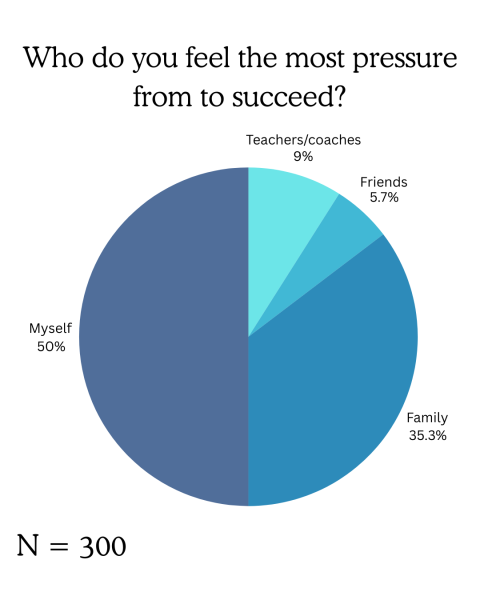Editor’s Note: * Indicates source would only agree to be interviewed on the condition of anonymity.
In today’s society, school hallways are filled with more than just students getting to class on time; they are filled with academic pressure, social expectations and concerns about the future. These challenges may lead to issues in student security, both in themselves and in their academic work. The school system may occasionally overlook the pressing needs of the student body and primarily focus on academic results.
Students, at times, reflect on their experiences at Plant and the school culture in a positive light. The transition of freshmen from middle school to high school may be a challenge to some, as there are students who will adapt better than others. However, that presents an opportunity for some. An opportunity to meet new people, see new friends and talk to old ones, classes become more expansive and informative, piquing some freshmen’s interest.
Mila Gerrish (9) said, “It’s exciting because I get to meet new people, see friends from different schools, and working with new people in different classes it really helps me expand my friend group. Everyone’s been pretty good so far, just complaining about classwork.” The new chapter of a student’s life includes the potential to meet new people and form lasting bonds.
Furthermore, the workload and curriculum can differ significantly from those in middle school, with new subjects and more demanding homework and projects. This shift can create a struggle to focus on time management, as it involves finding a balance between academic and social challenges. Which can take a toll on day-to-day life.
“It’s a lot of workloads compared to middle school. If I have a lot of work, I get in a worse mood, especially when I get home after a long day, but if I have less work to do throughout the day, then honestly, I feel better and have more personal time,” said Marina Agazzi (9). Students develop skills to avoid feeling overwhelmed by managing a harder load along with their personal lives, displaying how the stress of homework is not just about grades, but also about a student’s daily mood and energy.
In addition, classwork and homework can often overlap with extracurricular activities, creating an issue for students who struggle to manage their time in a balanced way. Especially when trying to meet academic expectations, maintain personal commitments and still allow time to rest. When students get overworked, it can lead to stress or a decline in academic performance.
Although extracurricular activities can benefit students by providing experiences and life skills, they also require a time commitment, which leaves less room for proper physical and mental health. Finding a healthy balance between these demands is an ongoing challenge for students, requiring effective time management and organization skills.
Darryon William (12) said, “Basically, I have no time to do any work because I go to football practice at 5 AM, and then after that, I have school. Then, I go back to practice after school, I get from 6 PM to whenever I go to bed to do all my work, I don’t have time if there’s anything else in my life, other than sports and school.” Student athletes may find it challenging to balance academics with the demands of their sport. The long hours of practice combined with a full school day can leave little time for homework, extracurriculars, and personal time.
In today’s demanding school environment, academic pressure and extracurriculars can often feel overwhelming. Developing effective strategies for managing one’s workload is a powerful tool for having a positive impact on mental well-being. By learning to prioritize tasks, plan ahead of time and set deadlines, students gain a sense of control over their schedules rather than procrastinating or feeling unproductive.
Lila Montgomery* (10) says, “As someone who has a lot of things on their plate, I think that workload is easier to manage when you’re organized and plan your time. I personally used a to-do list and a calendar, but there can be a struggle to keep up with everything, including my work, volleyball, clubs and school.” This perspective highlights how using effective strategies can help students manage their busy schedules. Although it can still be overwhelming, having tools like planners and routines allows students to stay on track and balance both their academic and extracurricular responsibilities.”
A competitive environment in school can cause a sense of pressure, and the feeling of being compared to peers can lead to stress, anxiety or burnout. Over 40% of students report persistent feelings of sadness or hopelessness, and over 20% consider suicide, as stated by the Centers for Disease Control and Prevention (CDC). This is both an internal and external issue, draining activities, taking a toll on both your physical and mental health.
“The constant pressure from all aspects of my life, including myself and my parents. The competition of getting into college, a higher GPA, and even in sports, for me, is a lot to uphold. Everything feels like a contest, but you can only win for yourself,” said Camille Rivera* (11). For many high schoolers, this pressure can feel like a universal experiment. The pursuit of academic success, a high GPA and placement in high-level sports teams are all stressors. It isn’t always for personal growth, but rather for a public performance to showcase colleges or their families how far they can go and what they can achieve.
Issues arise at times when students are worried about social media and the pressures they face from people online. Social media often portrays an overly exaggerated image of people, leading people to think of themselves as less. This may put pressure on individuals already balancing their academics with other responsibilities. Social media can be distracting and can do a lot of damage to the mental health of students, especially in formative years like those that a lot of plant students are in.
“Social media allows me to connect with people at school, finding their interests. In a bad way, it adds a lot of pressure about how people perceive you online, comparing yourself to others.,” Summer Wood (11) said. “I also have no sleep because of social media, which affects my workload and causes issues with my grades.”
Getting into a university for some seniors can often be one of, if not the most, stress-ridden times of their lives. Finding universities, going through applications, writing essays, finishing what they need to do, while still completing their schoolwork can pose a challenge to those who are not ready to manage so many responsibilities in their lives. For those students who choose to attend a university, they may be scared or unable to get help from people, seeing as the idea of true independence can seem daunting.
Reilly Cunningham (12) said, “I’ve been trying to balance what I do, going out, doing homework, family time, but the main stress I have is the anxiety of worrying what school I’ll get into, what I have to do, I just cope by trying to get everything done quickly.” Managing your daily activities and tasks while being in a state of mind that fosters a mindset filled with competition and pressure to get into college.
“I have the same kids for four years usually, so I’m very fortunate to be able to get to know them very well,” Valerie Houston, the AVID teacher at Plant, said. “So, if I see that they are struggling, I will personally take them out into the hallway and do a one-on-one chat and find out where they are. Sometimes you just got to let everything out.”
Students may find themselves under stress waiting for their college admissions results to come in, often thinking of the worst outcomes possible. This may lead to a collapse during their senior year, sometimes resulting in them giving up due to the insufficient help they receive. However, there are people ready to help and get students out of precisely those situations.
“The signs I look for when a student is struggling with mental health are changes in behavior, drastic changes in behavior, their workload, declining performance academically, any red flag,” said Allison Castellano, one of Plant’s guidance counselors. “The biggest barrier for students getting help is their parents finding out, they don’t know where to go, or they’re afraid to talk about their feelings.”
The different issues inside and outside of school may cause a decline in mental health and academic progress in students. However, schools often have services like guidance and social workers that help guide a student through those challenges and assist them in overcoming the difficulties they may face.
Unfortunately, many students struggle with expressing their emotions on a specific topic related to their opinions and feelings. Whether it be due to family pressures, societal norms, or even fears of rejection, parents may often be the most significant barrier when it comes to students getting the help they need.
“I think the school does provide support for academically struggling students, it’s not something I would do also because I prefer to learn from myself,” said John Lynn (11). “I feel like if a student wants it done, they must do it themselves, but if teachers ask, it would happen more often, rather than a student going and taking initiative.”
The most crucial part is knowing that you are not alone, resources and support are available – don’t hesitate to reach out. Currently, there is a lot of infrastructure available to help with any issue you might have. Reach out to guidance or any resource, like the SAMHSA National Helpline (1-800-662-HELP). The provided resources are designed to guide any student, even if the issue is minor. Always try to discuss what concerns you. That single conversation can be the start of your solution; don’t hesitate to take that first, most crucial step.


